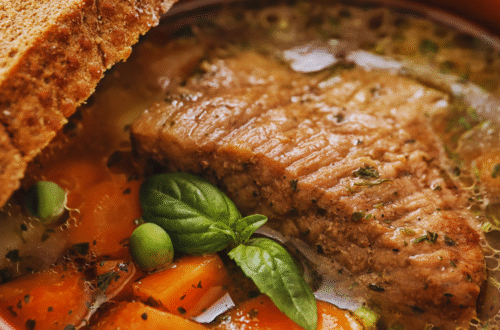
The Benefits of Meal Prepping: Save Time and Eat Healthier
Meal prepping has gained popularity as an efficient way to maintain a healthy diet. This practice involves preparing meals in advance, which can lead to significant time savings and reduced stress during busy weekdays. Those who engage in meal prepping often find it easier to stick to their nutritional goals while enjoying a diverse and satisfying menu.
In addition to saving time, meal prepping can help manage portion sizes and reduce food waste. By planning and preparing meals in advance, individuals can make more mindful choices about their ingredients and reduce impulsive eating. This approach not only supports health objectives but also leads to financial savings over time.
Ultimately, meal prepping offers a structured method to navigate a busy lifestyle without sacrificing nutrition. The focus shifts from daily decision-making to enjoying thoughtfully prepared meals, making it a worthwhile practice for anyone looking to improve their eating habits.
What Is Meal Prepping?
Meal prepping involves the preparation of meals ahead of time to save time, maintain a balanced diet, and reduce food waste. It can include cooking in bulk, portioning meals, or even preparing ingredients for quick assembly during the week.
Common Meal Prepping Methods
There are various methods for meal prepping, catering to different lifestyles and preferences. One popular approach is batch cooking, where large quantities of meals are cooked in one session. This often involves dishes like casseroles, soups, or other dishes that can be easily divided into portions.
Another method is ingredient prepping, where individual components like grains, proteins, and vegetables are cooked and stored separately. This allows for custom meal assembly, promoting variety throughout the week.
Some prefer snack prepping, which includes preparing healthy snacks in advance. By storing portioned snacks like nuts, fruits, or yogurt, individuals can easily reach for nutritious options rather than unhealthy choices.
Popular Meal Prep Foods
Selecting the right foods is essential for effective meal prepping. Protein options such as chicken, turkey, tofu, and beans are versatile and hold up well in the fridge. These proteins can be seasoned and cooked in bulk for diverse meal options.
Whole grains like quinoa, brown rice, and farro are also popular, providing a healthy base for meals. These grains are easy to cook in large quantities and can complement various proteins and vegetables.
Vegetables, especially those that store well, such as bell peppers, broccoli, and carrots, should be integral to meal prep. Prepping greens can include washing and chopping for salads or stir-fries.
Incorporating snacks like Greek yogurt, hummus, or sliced veggies can make meal prepping more convenient. These foods can help maintain energy levels and support a balanced diet during busy days.
Key Benefits of Meal Prepping
Meal prepping offers multiple advantages that can enhance daily life. From saving time during busy weeks to ensuring healthier food choices, meal prepping serves as a powerful tool for individuals seeking better control over their nutrition and lifestyle.
Saves Time and Streamlines Routines
Meal prepping significantly reduces the time spent on daily cooking. By dedicating a few hours each week to preparing meals, individuals can eliminate the stress of last-minute cooking.
For instance, preparing a week’s worth of lunches on Sunday means less time spent in the kitchen during busy weekdays. This efficiency allows for smoother daily routines, enabling individuals to focus on other important tasks or enjoy more leisure time. Utilizing storage containers effectively can further enhance organization. Grouping similar meals or ingredients in clear containers makes meal selection quick and easy.
Supports Healthier Eating Choices
Having pre-prepared meals readily available encourages healthier eating habits. When nutritious options are the easiest to access, individuals are less likely to opt for unhealthy convenience foods. By planning meals around balanced nutrition—such as incorporating lean proteins, whole grains, and fresh vegetables—people can ensure they meet their dietary requirements.
Additionally, individuals can avoid impulse eating and poor snack choices. Being proactive in meal preparation empowers individuals to take control of their dietary intake, leading to better health outcomes.
Reduces Food Waste
Meal prepping plays a crucial role in minimizing food waste. When individuals plan their meals efficiently, they purchase only what is necessary, reducing the likelihood of forgotten perishables. By utilizing leftovers creatively in future meals, one can further maximize food use. For instance, roasted vegetables from one dinner can be transformed into a hearty salad or soup for lunch.
This approach not only supports sustainability but also helps manage grocery budgets effectively. Less waste translates into cost savings, reinforcing the benefits of thoughtful meal preparation.
Promotes Consistency and Portion Control
Establishing a meal prep routine fosters consistency in eating habits. By sticking to a planned meal schedule, individuals are less likely to stray into unhealthy eating patterns.
Portion control becomes easier when meals are prepared in advance. Knowing the exact amounts of food in each meal assists in maintaining an appropriate caloric intake. This structured approach is particularly beneficial for those looking to manage their weight. Adhering to specific portions helps prevent overeating, keeping dietary goals on track.
Implementing Meal Prepping in Daily Life
Starting a meal prep routine can significantly enhance convenience and nutrition. By adopting practical strategies, individuals can streamline their cooking process while reaping the benefits of healthier eating habits.
How to Get Started With Meal Prep
To begin meal prepping, individuals should first choose a consistent day and time each week dedicated to planning and preparing meals. This provides structure and helps establish a routine. Next, select recipes that can be easily multiplied and stored. Focus on dishes that hold up well in the fridge or freezer, like soups, casseroles, or grain bowls.
Creating a shopping list based on the chosen recipes can simplify grocery trips and reduce food waste. Investing in quality containers is also essential; opt for glass or BPA-free plastic options that are microwave and dishwasher-safe.
Tips for Maintaining Meal Prep Habits
To sustain meal prepping, set realistic goals that align with lifestyle needs. Start with preparing a few meals each week and gradually increase as comfort grows.
Incorporating variety keeps the meal prep exciting. Rotate recipes weekly or explore new ingredients to maintain interest. Sharing meals or prepping with family or friends can foster motivation. This social aspect adds enjoyment and accountability.
Lastly, track progress and adjust plans as needed. Reflecting on what works and what doesn’t ensures individuals can refine their approach over time, making meal prepping a sustainable part of their life.





